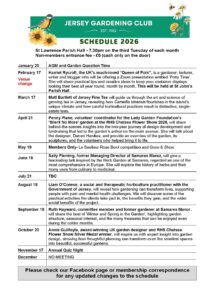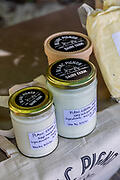
A speech by the Minister for The Environment, Deputy Steve Luce, given at the annual Jersey Farming Conference on 6 November 2025. Slightly edited
This conference is an annual meeting where farmers and landowners, and the rural community, are brought together to talk and think ‘farming’. Whether you’re a grower, dairy farmer, landowner, or someone who simply loves the countryside, we are all part of the Island’s metaphorical and physical landscape.
As we all know, Jersey’s farming heritage is very long, hugely rich and extremely proud. From our iconic Jersey cow (now over 4m worldwide) to our world-class produce, this Island has always punched above its weight.
Today, I want to talk a very little about technology….and how we are using local knowledge connected to global innovation to shape the future of farming here….. and beyond.
Personally, I’ve had a mixed career when it comes to tech….more specifically R and D. Originally at Woodside in the 80’s we pioneered the use of 4wd tractors- worked with Grimme to develop the GZ to dig Jersey Royals. At the end of the 80s when I farmed on my own I deliberately ran a ‘low tech input’ dairy farming, but I worked with Samro to (try) to develop cameras to grade potato on their harvesters. At Jersey Oyster we only had basic non-electronic tractors with gear sticks straight into gearboxes….mixing elector ice and sea water never went well….but we all used absolutely state of the art high tech graders that would weigh over hundreds of thousands of oysters to an accuracy of just 1 or 2 grammes every hour. Technology in that case saved us huge amounts of time….and did a far better job than we could ever do by hand and eye.
Over the past ten years or so, farming has undergone a quiet revolution. Across Jersey, we’ve seen the adoption of tech across all aspects of the farming community….. GPS guided machinery, drone technology, and soil mapping tools that help you manage your land with greater precision and care.
We’ve seen automated irrigation systems that can conserve water, and digital platforms that track everything from crop health to livestock welfare…not least ear tags for cattle being able to monitor just about everything that animal does throughout her day, and night! These tools are helping Jersey’s farmers respond to some of the challenges posed by climate change, soil degradation, and market volatility….but health is the most important thing….soil health, plant health and particularly animal health.
Globally, the same technologies are being used to tackle food insecurity, reduce emissions, and improve biodiversity. Jersey may be small, but it’s part of a much larger movement—one that’s redefining what it means to farm sustainably. Our ‘other’ annual farming conference, REGEN, is going from strength to strength, showing how sustainable standards are changing year on year, and encouraging us to look beyond pure commercial production….and I thank all those who help organise, what is fast becoming, a real ‘look forward to’ event.
But let’s not forget the role that renewable energy can play on our farms moving forward. Solar panels, anaerobic digesters (and electric vehicles) are becoming more common on farms, helping reduce carbon footprints and build energy resilience. We’ll see those first AD plants appearing on farm very soon I hope….with others to follow across the Island in strategic places.
Climate Change is a subject that now forms a big part of my role as Environment Minister. Reducing carbon, and providing energy from sustainable sources, are massively important as we seek to slow down the effects of a changing planet. I always look upon very long term ‘energy decisions’ as ones that I am not making for myself or my children, but for my grandchildren. It is their world that will feel the greatest effects of these changes to our planet….and we must all do what we can to make our planet’s future as good as possible.
Solar panels are a good source of sustainable energy. I have always said that I think that farmers should be able to ‘grow’ solar power in their fields in the same way as they grow other crops. Producing sustainable energy from solar can become part of your farm income, and help balance the books. Farming isn’t getting any easier, and the physical changes to our climate are starting to have big impacts on our farms. Weather is becoming more and more extreme, and for longer periods.
When it comes to the proposed solar farm in Faldouet (down by St Saviour’s Hospital) I think we here in Jersey have a wonderful opportunity to ‘do our bit’ to help with climate change. The site could become a European centre of excellence. It could show how we could be helping farmers, and producing sustainable energy, by enabling research and education to happen at the same time. In combining the latest agrivoltaics, solar technologies, and innovations, Jersey could well end up leading on this type of agricultural initiative….we’ve led before (hydroponics being one example….or tracking Asian hornets….we are the ‘go to’ UK centre for this work) so let’s see if we can ‘lead again’ with solar in fields, working for farmers, not against them.
The proposal in St Martin is for a range of solar technologies including solar panels that are fixed on a tilt, solar panels that track the sun, and vertical panels. All these will be used across the site to provide a whole range of agricultural activities from growing crops right through to cattle and sheep grazing.
This project, if approved, will be working with Harper Adams, the UK’s leading university for food production and agriculture technology. I am sure that given all those facts, and having a tie up with The Crown (as we all know, His Majesty is great advocate and support of the environment) the site could become a leading example of agrivoltaic practices and sustainable food production. What better way to demonstrate that we are taking the subject of climate change seriously.
While I accept that these proposals will not be agreed by everyone in the parish, or across the Island, I really hope that we will look back in years to come and see that we did the right thing, and play our part in showing others how it’s possible to transition to a carbon free and sustainable future.
Let’s look at some other local examples of where tech is already helping us:
• The increased use of GPS in our tractors prevents overlapping bout widths, saving time, fuel, and reducing soil compaction. It’s especially beneficial when applying pesticides and fertilisers, ensuring accurate applications. Combined with automated nozzle cutoff control on crop sprayers, this technology reduces overspray— particularly valuable in Jersey’s small and often awkwardly shaped fields.
• Most of the Island’s dairy units now have automated slurry scrapers or slurry robots in cubicle buildings. These reduce labour costs, improve hygiene and animal welfare, and lower emissions from sitting slurry.
• Several dairy farmers have mechanised cubicle cleaning and bedding-out using self-propelled sawdust and bedding dispensers—another example of innovation improving efficiency and welfare.
• In-field weather stations positioned across the Island are helping potato growers reduce pesticide applications. By monitoring conditions that favour potato blight, growers can time fungicide applications more precisely, reducing environmental impact and cost.
Challenges and Opportunities
Of course, technology isn’t a silver bullet. It can be expensive, complex, and sometimes hard to integrate into traditional practices. In Jersey, we face unique challenges—limited land, high input costs, and the need to balance farming with conservation and tourism….while also trying to help biodiversity and pollinators…it’s anything but straightforward.
But we also have unique strengths: a close-knit farming community that works hard together, a strong identity with our Jersey-based brands, and a willingness to innovate. The key is to ensure that technology works for farmers — not the other way around. That means investing in training, connectivity, and support systems that make innovation accessible to all.
Looking Ahead
So what does the future look like? Well, one thing we do know is that technology is moving at a frighteningly fast pace…and sometimes it’s difficult to keep up.
We’re entering an era of smart farming ecosystems—where AI, robotics, and machine learning will help predict disease outbreaks, optimise planting schedules, and even automate harvesting.
‘Carbon farming’ and ‘natural capital accounting’ will become central to how we value, and reward, environmental stewardship. Jersey’s farmers will be recognised not just for what they produce, but for the ecosystems they protect and the carbon they store.
We’ll see more collaborative platforms—linking Jersey’s farmers with researchers, policymakers, and global networks. This will help us stay ahead of trends, share best practices, and ensure that Jersey remains a leader in sustainable agriculture.
We’ll continue to explore biological inputs, regenerative practices, and climate-resilient crops—ensuring that our farming systems are not only productive, but also resilient and nature-positive…and who knows?… perhaps in the near future we’ll see methane-powered tractors fuelled by our own anaerobic digesters. Or drones delivering pesticide applications—reducing crop and soil damage, improving timing during wet conditions, and minimising operator exposure, especially on our côtils….and we’ve seen trials doing just that.
Government has a role to play. We are committed to supporting innovation, improving rural connectivity, and ensuring that Jersey’s farming sector remains vibrant, competitive, and sustainable.
I was heartened to hear about the recent evening presentation by our colleagues at Digital Jersey, where a range of truly innovative technologies were described—from in-field laboratory monitoring to ultra-thin graphene for space heating and integrated photovoltaics in construction materials. Technology moves apace, and I for one am excited to see how we as an Island can capitalise to our mutual advantage.
In order to help you all move forward and use ‘tech’ to make your businesses more profitable, let me remind you of help that is out there from Government. The Agricultural Loans scheme is there to help with big projects….but, more suited to the size of things you might wish to use technology for, Tier 4 of the Rural Support Scheme provides grants for projects … every business on the RSS has an offer based on the points gained from credits … the budget for this is just over £1.5m per year … we grant up to 80% of the value of projects, but looking at last year’s figures the industry contributed over 50% of the costs … so that’s over £3.0m investment going into the sector in 2024. And again in 2025. A number of these projects are for technological improvements/machinery etc.
Jersey Business is also running the Better Business Support Package with 50% grants up to £75k for projects which improve productivity in 2025 and 2026. I would urge you, if you’re thinking about a particular piece to kit, whatever that might be, please get in touch….we want to help!
To all of you here today: thank you. Thank you for your dedication, your innovation, and your care for the land….and your animals.
I know that farming is tough….and not getting any easier… but I really do believe that Jersey’s farming future is bright—not because we’re following global trends, but because we’re shaping those trends in our own way.
Let’s embrace technology not as a threat to tradition, but as a tool to strengthen it. Together, we can build a future where farming is rooted in Jersey’s values—and connected to the world via our sustainable exports. Thank you.




